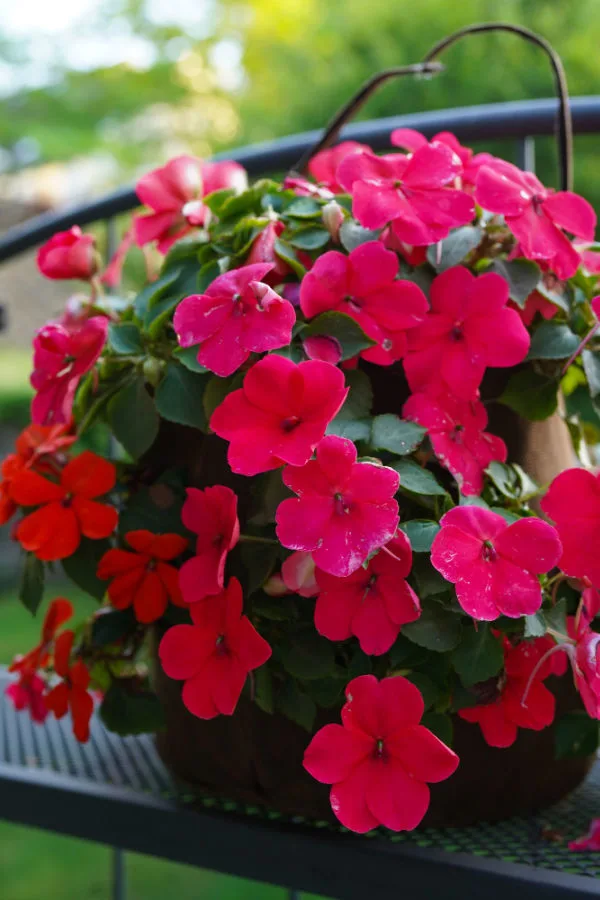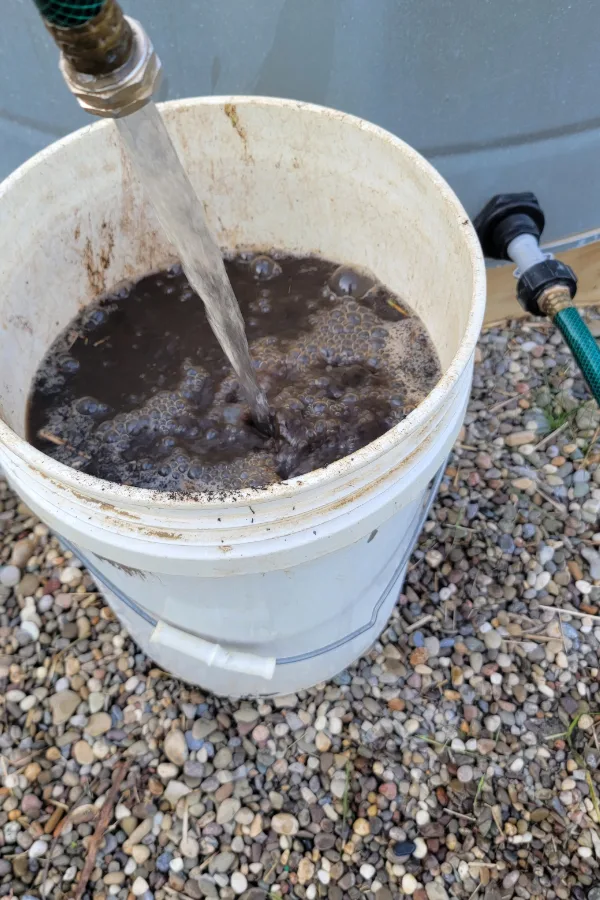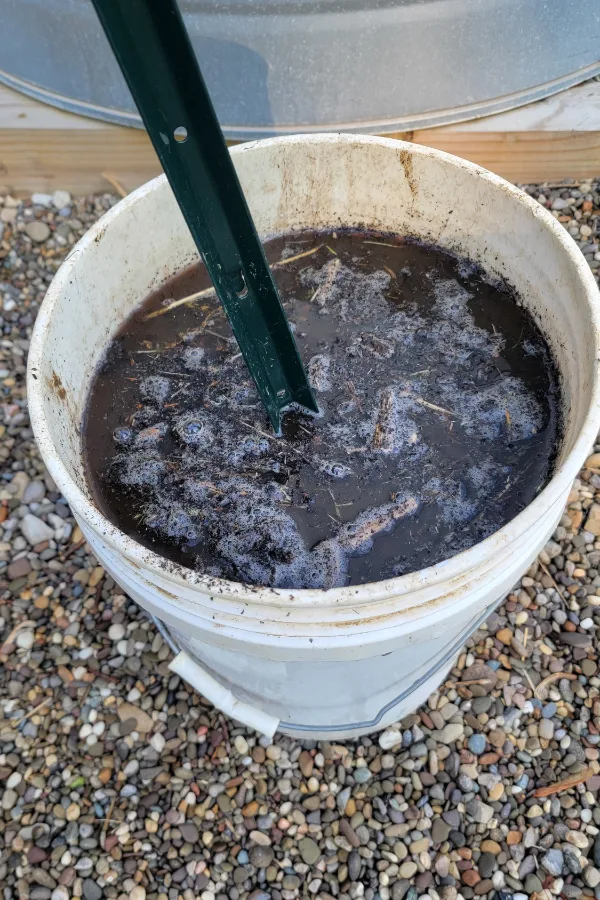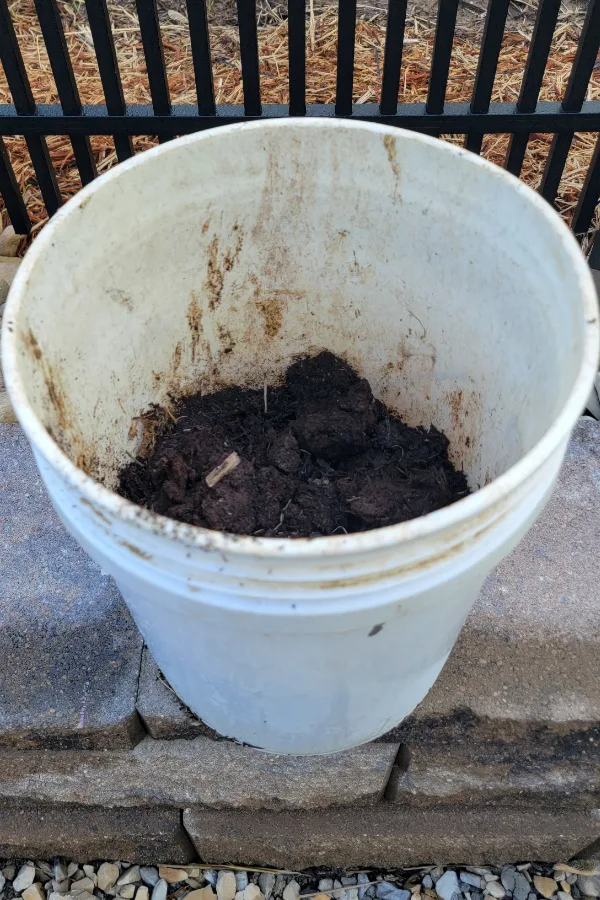There is simply no better way to power your plants naturally than by using compost tea – especially when you consider you can make it at home without any special equipment – and entirely for free!
Compost tea is quite simply magical. Made from just two simple ingredients, compost and water – it truly is an all natural wonder. Not only can it power annual flowers, vegetable plants, and herbs, but it’s also excellent for energizing perennials, shrubs and even trees.
Compost tea works its magic by feeding plants in two unique ways. First, it supplies nutrients to a plant by absorbing into its roots as the liquid tea soaks into the soil. But it also provides energy to the plant by soaking into its leaves as well.

This double-dose of power certainly allows the all-natural fertilizer to work quickly. But what really makes compost tea incredible is just how balanced and powerful its nutrients are – and how easy they are for plants to absorb.
The Power Of Compost – And Compost Tea!
Compost is loaded with all types of nutrients. And all of those nutrients are in their purest form, having slowly decomposed into a light, sweet smelling, humus-filled substance that many gardeners refer to as “Black Gold”.
From Nitrogen, Phosphorous and Potassium, to Calcium, Magnesium, Sulfate and more – compost contains all of the major nutrient players that plants need most for good growth and production. In fact, that long list of nutrients is exactly why compost is so good for adding into planting holes to help power plants.
But when you soak compost in water, all of those amazing and perfectly balanced nutrients leach into the water. And when they do, they create a liquid fertilizer that oozes with fast-acting, 100% organic power!
Listen To Our Podcast On How To Make & Use Compost Tea Like A Pro!
But perhaps what just might make compost tea truly amazing is that it so easy to make at home. And, if you happen to have your own compost pile and a supply of fresh water, you can make as much as you need, entirely for free!
The Easiest Way To Make Compost Tea At Home
We have been making our own compost tea at home now for over twelve years. And, in spite of what you might read on the internet – it doesn’t require special tools or fancy aerating pumps to make a powerful fertilizing tea.
In fact, to make our tea, we use a simple 5 gallon bucket, a stir stick and a strainer. Along, of course, with a few shovel fulls of compost and water.
Can pumps and air percolating tubes be used to make it? Certainly. But at the end of the day, by simply allowing your compost to soak in the water for a few days, and stirring it once or twice a day, you will end up with the same powerful fertilizer the fancy pumps can create. And with far less mess and work.
One thing is for sure, the simple method below works! We know this because we have watched it power our plants to amazing heights year after year.

With that in mind, here is a look at how to make your own incredible compost tea – along with how and when to use it to power up your vegetable garden, flowerbeds, hanging baskets and potted plants!
The Method – How To Make Your Own Compost Tea At Home
To create your own tea, begin by filling a 5 gallon bucket 1/3rd full of compost. It is best to use completely finished compost. Mature compost is best because its nutrients are completely broken down and will absorb quickly and more easily into the water.
If you don’t have readily available compost, you can also use commercially bagged compost. The key to making a good tea is no matter what you use, make sure it is pure, 100% fully aged compost. (Affiliate Product Link : Charlies Bagged Compost)
Once you have the compost in the bucket, fill it with water to within an inch or so of the top of the bucket. It is important to use well water or distilled water.
Unfortunately, treated municipal water can have chlorine and other chemicals that can negatively affect the balance of nutrients. In some cases, those chemicals can harm the plants you put the tea on as well. The same goes for water that is coming from a water softener as well.
If you happen to collect rain water, that is another great option in place of well or distilled water. We have been using the water from our rain water tanks for years and love it for making our fertilizer teas.
The Waiting & Stirring Game – How To Make Your Own Compost Tea At Home
Once you have filled the bucket with compost and water, stir up the mix for a few minutes with a stirring stick. This helps release the compost’s nutrients into the water. The process is very similar to dunking a tea bag to release more tea into your drink.
Continue stirring a few times each day over the course of a five day period. Each time you stir, it helps to release more nutrients. This is where some compost tea makers will tell you to insert an aerating pump to help keep the water active.
To be completely honest, we have tried both methods many times as an experiment. Not once have we ever noticed a difference between one tea being stronger or better than the other. Both methods work – so for us – choosing the simple stirring method makes the most sense!

After five full days, the water & compost mixture will be charged full of nutrients and ready to go. To use, simply strain the compost mixture using a mesh screen or strainer. Toss the used compost back into your pile to recharge, and your liquid is now ready to use compost tea!
Where & How To Use
As you will see below, fertilizing tea can be used on a wide variety of plants all over the landscape. You can store the tea for up to a few months in a sealed container. For us, that is never a problem because we use it so much, it never seems to last.
When storing, simply place it out of direct sunlight and keep it capped to hold in as many nutrients as possible. This also will help avoid evaporation. Now you’re ready to fertilize, and with that in mind, here’s a look at some of the best places and ways to use it!
Vegetable Plants
Compost tea is the perfect all-natural fertilizer for vegetable plants. When using in the garden, apply every two weeks once transplants or seed crops have become established.

Water each transplant with a quarter gallon of compost tea, being sure to soak the leaves a bit as you do. This will help the plants absorb the nutrients via the foliage as well.
As when watering, it’s best to apply compost tea early in the day or in the early evening. Unfortunately, watering or fertilizing during the heat of the day can scorch plants with the sun’s rays and the fertilizer combo.
Hanging Baskets & Containers
Compost tea is sensational for keeping container and hanging basket plants thriving! Simply water with the tea every 5 to 7 days to give a small boost to plants all summer long. Do this in place of a regular watering.
Using Compost Tea In Flower Beds
In addition to vegetable plants and container plants, compost tea is a great boost for annuals and perennial flower beds too. Just as in the garden, apply every few weeks to keep plants supplied with a steady stream of nutrients.
Here is to making your own amazing fertilizing tea with compost, and powering your plants like never before this year! Happy Gardening! Jim and Mary.
Jim and Mary Competti have been writing gardening, DIY and recipe articles and books for over 15 years from their 46 acre Ohio farm. The two are frequent speakers on all things gardening and love to travel in their spare time.
As always, feel free to email us at thefarm@owgarden.com with comments, questions, or to simply say hello! You can sign up for our free email list in the subscribe now box in the middle of this article. Follow us on Facebook here : OWG Facebook. This article may contain affiliate links.

